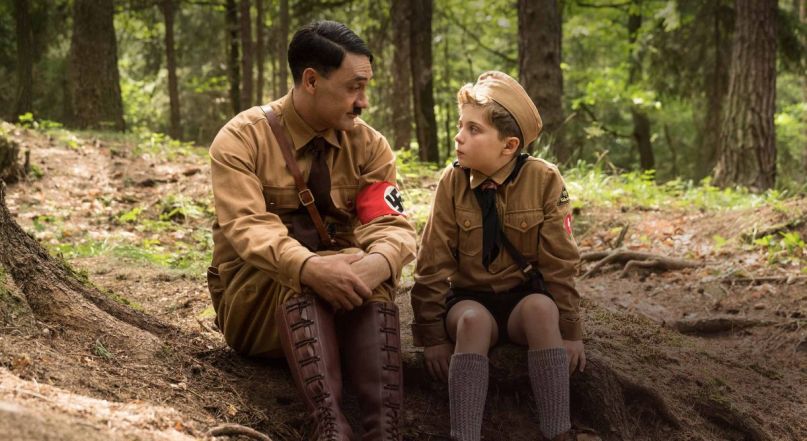
Title: ‘Jojo Rabbit’
Director: Taika Waititi (‘Thor: Ragnarok,’ ‘What We Do in the Shadows’)
Starring: Roman Griffin Davis, Thomasin McKenzie, Waititi, Rebel Wilson, Stephen Merchant, Alfie Allen, Sam Rockwell and Scarlett Johansson
Sometimes it takes a child’s innocent outlook on politics, relationships and existence overall to influence and change the views of their peers, families and adults in their lives. That not only relate to contemporary society, but also culturally throughout the past few generations. The exploration of how childlike innocence impacts society throughout the years is explored in the new war movie, ‘Jojo Rabbit.’
Fox Searchlight Pictures is set to release the enlightening comedy-drama, which was written, directed and produced by versatile filmmaker, Taika Waititi, the helmer of ‘Thor: Ragnarok’ and ‘What We Do in the Shadows,’ tomorrow in theaters. The official distribution comes after after the feature had its US Premiere last month at the 35th Annual Boston Film Festival.
‘Jojo Rabbit’ follows the title protagonist, Jojo Betzler (Roman Griffin Davis), a 10-year-old German citizen who believes that he’s fully committed to the ideologies of the Nazi party during the ending of World War II. Despite the protests of his mother, Rosie (Scarlett Johansson), against the war, partially due to her husband’s whereabouts being unknown since he began fighting in Italy, and the death of their young daughter, the young boy decides to participate in a camp that teaches boys basic Hitler Youth skills.
Led by Captain Klenzendorf (Sam Rockwell) and his assistant, Fraulein Rahm (Rebel Wilson), Jojo and his recruits embark in activities as book burning, grenade throwing and killing, which begins with a rabbit. When the comedy-drama’s hero unintentionally shows signs of hesitancy over killing the helpless animal, he earns the title nickname, and ridicule from the rest of the camp. Then trying to prove his worthiness, Jojo launches his grenade, which leaves him physically-and emotionally-scarred.
After being sent home, Jojo’s comforted by both his mother and his imaginary friend, an exaggeratedly flamboyant and energetic version of Adolf Hitler (Waititi), who has offered the boy guidance and support while his father has been away, fighting in the war. While Jojo’s interactions with his imagined hero are urging him to still fully embrace the Nazi lifestyle, despite his injuries, the boy slowly begins to question whether the antics he long held dear are truly appropriate anymore.
Jojo’s beliefs are further tested when he discovers that his mother is hiding a Jewish girl, Elsa (Thomasin McKenzie), in a secret chamber in the wall behind a panel of their upstairs study. The more Jojo gets to know his fellow adolescent, the more he begins to realize that his long-held beliefs about the world may have been wrong, and the people who he felt were his enemies and allies may actually be the reverse of what he always thought.
Waititi, who has long proved his talent at mixing relatable comedic and dramatic elements into the struggle of mankind (and the creatures they interact with) into his films, especially ‘Thor: Ragnarok’ and ‘What We Do in the Shadows,’ proves once again what a satirical writer, director, producer and actor he is with ‘Jojo Rabbit.’ Taking narrative cues from his fellow filmmaker, Wes Anderson, Waititi shows that a percentage of mankind, and not alien races or vampires, can actually be the truly most frightening threat to humanity. While infusing his portrayal of the infamous former leader of the Nazi Party with a gripping theatrical extravagance, the filmmaker-actor successfully emphasized how even the seemingly most absurd political ideas can captivate a multitude of followers, if the message is presented in the right context.
The young Davis, who made his feature film acting debut in ‘Jojo Rabbit,’ powerfully maintained a strong, lasting presence on the screen alongside his writer-director, as well as Tony Award-winning Johansson and Oscar-winning Rockwell, whose Captain Klenzendorf also served as an influential father-figure to Jojo. While the young boy’s initially unwavering acceptance of Hitler’s political and social beliefs are an unfortunate reminder of the enduring support of the Nazi Party throughout a large portion of the German population during World War II, Davis’ emotional portrayal of Waititi’s satire of politics from both the 1940s and today, makes the protagonist a vital part of making the comedy-drama so poignant and culturally significant.
Sometimes it takes a child’s innocent outlook on politics, relationships and overall existence to influence and change the views of their peers, families and adults in their lives. That not only relate to contemporary society, but culture throughout the past several generations. The exploration of how childlike naiveté impacts society is explored in ‘Jojo Rabbit,’ which further proves how versatile of a filmmaker Waititi is, and what a promising acting career Davis has ahead of him.
Technical: A-
Acting: A-
Story: B+





